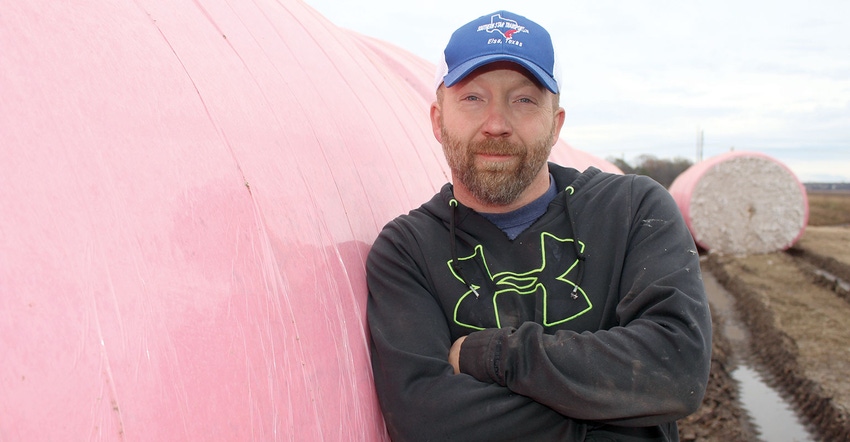
According the National Weather Service, Memphis, Tenn., and the surrounding communities were barely below average rainfall amounts for October and November, but December rainfall totals were already above average at the middle of the month. This comes as no surprise for many cotton gin managers across much of the Mid-South because they have been ginning a great deal of wet cotton this season.
Although Robert Atkins has been working at Three Way Gin outside of Tunica, Miss., since 2000, this is his first season as gin owner Brad Cobb’s gin manager. Originally from Jena, La., Atkins learned the ropes of ginning under Cobb’s former gin managers Charley Knabb and Steve Ratliff, and Atkins’ stepfather, Ricky Farmer. “I’ve enjoyed learning the ginning business,” says Atkins, who was offered the manager’s job after Farmer was diagnosed with cancer last year. “Ricky’s cancer has since gone into remission, he works every day and even stops at the gin to see me periodically.”
Three-Way Gin farmer clients have steadily increased acreage over the last several years, which has subsequently increased the workload for Cobb’s gin crews. “At one point, when cotton acreage was down, we ginned only 8,000 bales,” remembers Atkins. “By the time we press the last bale this year, I think we’ll hit 33,000.”
Water, Water Everywhere
Three-Way Gin operates two Lummus 170 and one Lummus 117 gin stands. Despite having enough capacity to handle the number of round modules they expected to receive this year, the amount of wet cotton has slowed down their ginning system and the mechanical problems they have encountered also hindered production. At one point, Cobb had to ask a few other gins in the area to pitch in and help them out a little. “Mother Nature has been pretty good to us the last few years. Our growers have been able to harvest their cotton and get it to us in timely manner,” says Atkins. “This year has been completely different.”
Despite handling all round modules, headaches have been frequent. Rains kept module trucks from picking up staged modules in muddy fields. “While round modules are usually safe from becoming damaged by standing water, we’ve had so much rain that we’ve seen cases where water has risen over the top of that 4-inch plastic module cover lip,” explains Atkins, shaking his head pointing to a module. “We can dry lint but trying to gin seed cotton with saturated seed is beyond difficult.”
Wet cottonseed and gin saws do not mix well – at all. “We’ve gone through more gin saws this season than we have during any season since I’ve been here,” adds Atkins. “Wet cotton tends to tag more on the gin stand. It just sticks on the gap between the rib and the saw.”
Atkins normally likes to keep replacement saws on site. That allows him to replace a damaged saw in about two hours. “If we don’t have one here, that requires calling someone and waiting until they arrive — and that can take six hours or more,” laments Atkins.
Fire
Originally from LaSalle Parish in central Louisiana, Atkins was a volunteer firefighter and construction worker. One afternoon he was clearing green shrubs off a fence line at his former wife’s home. After stacking the shrubs, pouring on gasoline, and lighting it, he turned back toward the house and saw his stepdaughter watching. “All of a sudden I realized I was on fire,” remembers Atkins. “Whoever coined that ‘stop, drop, and roll’ advice has never been on fire. All you want to do is run!”
After putting himself out, Atkins went into the house to change clothes. When he came back out, a neighbor who had seen what happened came up and asked if he was okay. Suddenly, Atkins felt something running down the back of his neck. “When I put my hand on my neck, a large section of skin came off,” says Atkins.
He went blank after that but does not recall anything until he returned home from the hospital — his head completely wrapped in bandages. Instead of going back home to Louisiana, he decided to stay in Memphis with his mother and stepfather. For the next few weeks Atkins visited the Regional Medical Center where doctors evaluated his progress and redressed his wounds. “Remarkably, I never stayed in the hospital one day and never had a skin graft,” adds Atkins.
The local fire chief came to the site of the accident, found the gas can and discovered a small hole, that unbeknownst to Atkins, was allowing gas to come out and onto his body. “The chief used that gas can for years as a teaching aide during his fire education training at local schools in Louisiana,” remembers Atkins.
Three-Way Gin serves six growers in and around Tunica, Miss. “All of our growers are within a 35-mile radius, so that’s not too bad for module truck logistics,” says Atkins. “If we can just catch a window of good weather, that would really help us right now.”
Atkins is focused on doing everything he can to wrap up the 2018 ginning season. “After going through being set on fire and burned, having to deal with wet cotton may be frustrating, but it’s not life or death!”
About the Author(s)
You May Also Like




